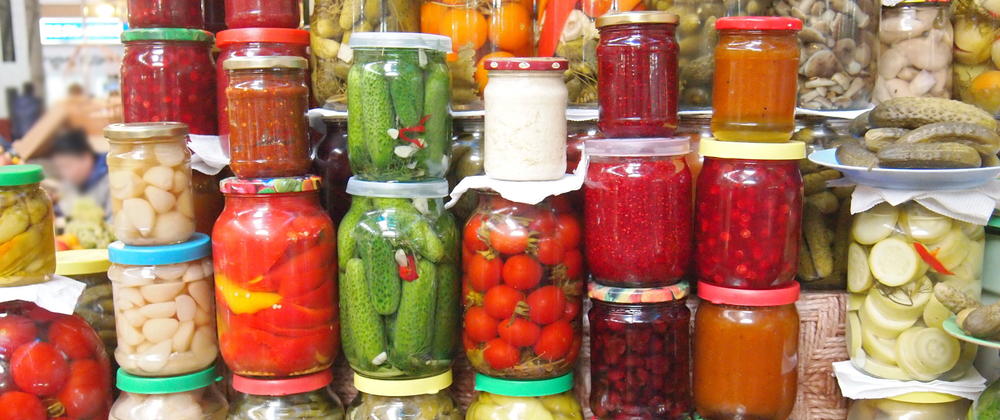The cold weather is here, and you know what that means: lots of cozy evenings curled up with a good book and a mug of hot cocoa.
But while we’re all about coziness, we also want to take advantage of the restorative powers of nature. So how can you get those winter blues out of your system? By adding some fermented foods into your diet.
Fermented foods are great for digestion, which is why they’re so popular in traditional diets around the world. But they’re also packed with other benefits.
Here’s why you should eat fermented foods:
Fermented Foods are Full of Probiotics
Probiotics are tiny organisms that help our bodies stay healthy by keeping our digestive systems in tip-top shape. They do this by helping us fight off harmful bacteria and other nasty stuff that can make us sick.
Fermented Foods are Full of Enzymes
Enzymes help break down food, which means more calories for you! And if you’re not getting enough calories, then there goes your metabolism—and we don’t want that to happen, do we?
Fermented Foods Give Us Vitamin C
Vitamin C which is an antioxidant protects our cells from damage caused by free radicals, which cause inflammation and cancer cell growth in the body (among other things). It also helps keep skin looking young and vibrant!
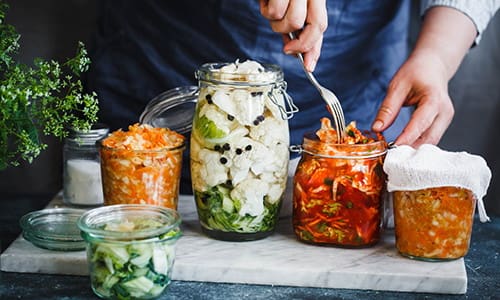
Fermented Foods Have Tons of Fiber
Fiber reduces the risk of heart disease, type 2 diabetes, and certain cancers (including breast cancer). This alone might be reason enough to start incorporating them into your diet—but wait until you hear how they can help your gut health too!
Improves Digestive Health
The good bacteria in fermented foods can help improve your gut health, which is vital for overall health. When buying your food, be sure to buy those preserved in the fridge instead of those on the shelves. This way, you can rest assured that the fermented food still has its live bacteria.
So, if you want to add some fermented foods to your diet this winter, here are the 10 best ones to try!
1. Sauerkraut
Sauerkraut is a form of fermented cabbage native to Germany. It’s made by salting shredded cabbage and letting it ferment in its juices for a few weeks. Sauerkraut is rich in probiotics and vitamins A, making it one of the healthiest fermented food.

2. Fermented Pickles
Pickles are another fermented food that’s made from cucumbers. They’re usually soaked in vinegar or brine solution, which gives them a sour taste. Pickles are a good source of probiotics and are low in calories, making them an excellent snack for those watching their weight.
Related: How To Make Pickled Garlic (And Why You Should Do It)
3. Kimchi
Kimchi is a traditional Korean dish with cabbage, radishes, and other vegetables. It is fermented in a brine of water, salt, and spices and then typically left to age for several weeks. Kimchi is often spicy and can be used as a dressing or side dish.
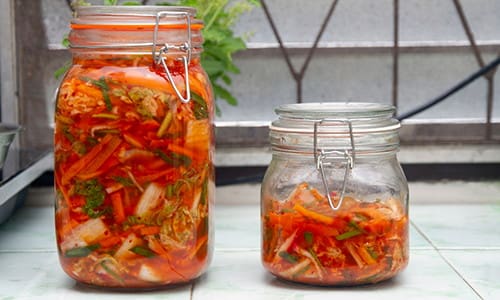
4. Kombucha
Kombucha is a fermented tea that’s rich in probiotics and antioxidants. It’s made by adding a symbiotic colony of bacteria and yeast (SCOBY) to sweetened tea and then allowing it to ferment for a few weeks. Kombucha has a slightly sweet and sour taste and is often flavored with fruits or herbs.
5. Tempeh
Tempeh is made by soaking soybeans in water and then allowing them to ferment. This fermentation process breaks down the soybeans’ complex carbohydrates, making them more easily digestible. Tempeh is an excellent source of protein, fibre, B vitamins, iron, and magnesium.
6. Natto
Natto is a fermented soybean dish that’s popular in Japan. It’s made by adding bacteria to boiled soybeans and allowing them to ferment for a few days. Natto has a strong, cheesy flavour and is often eaten for breakfast with rice and eggs.
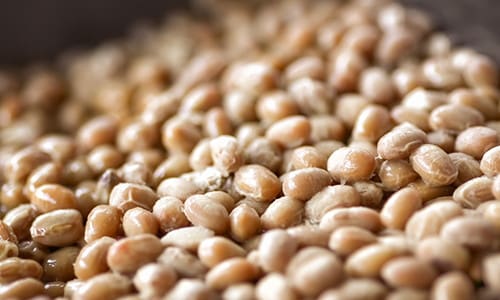
7. Miso
Miso is a mixture of cooked soybeans and a fermenting agent, usually rice or barley mould (koji). The mixture then ages for several weeks or months, developing a rich, savoury flavor. The final product ranges in color from white to dark brown, and in texture from smooth to chunky. Miso is, therefore, a good source of protein and vitamins.
8. Yoghurt
Yoghurt (or yogurt) is a fermented dairy product that’s made by adding bacteria to milk. The bacteria ferment the lactose in the milk, which gives yoghurt its characteristic tangy flavor. Yoghurt is a good source of calcium and protein and can be eaten plain or used in recipes.
9. Cheese
Cheese is another fermented dairy product that’s made by adding bacteria to milk. The bacteria ferment the lactose in the milk, producing lactic acid. This process gives the cheese its characteristic tart flavor and makes it slightly acidic. There are many types of cheese, from hard cheeses like cheddar to soft cheeses like brie.
The cheese depends on the type of milk used, the bacteria used, how long the cheese is aged, and other factors.
Related: How To Wax Cheese For Long Term Storage
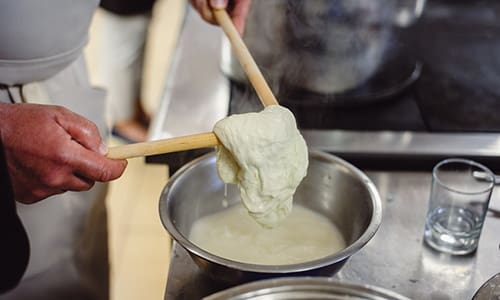
10. Sourdough Bread
Last but not least, sourdough bread is a form of bread made with a sourdough starter. The starter is made with flour, water, and bacteria or yeast. The bacteria or yeast ferments the sugars in the flour, which gives the bread its sour flavor.
The dough for sourdough bread is made by mixing the starter with salt, flour, and water. The dough is then for several hours to facilitate proofing (rising). After rising, the dough is shaped into a loaf and baked. Sourdough bread has a chewy texture and a slightly sour flavor. It is often used for sandwiches and toast.
So there you have it!
These are the fermented foods you should be eating this winter. You’ll feel so much better, and your body will thank you for it.
We hope our list has inspired you to take a closer look at the foods in your pantry—maybe even start fermenting some of them yourself!
You may also like:
 I Fermented My Entire Garden, Now What?
I Fermented My Entire Garden, Now What?
The Lost Remedies of Our Grandparents That You Should Still Have at Home (Video)
How to Grow Vegetables in Small Spaces
How To Keep Your Livestock Safe In Bad Winter Weather
8 Common Mistakes Most People Make When Preparing For Winter
